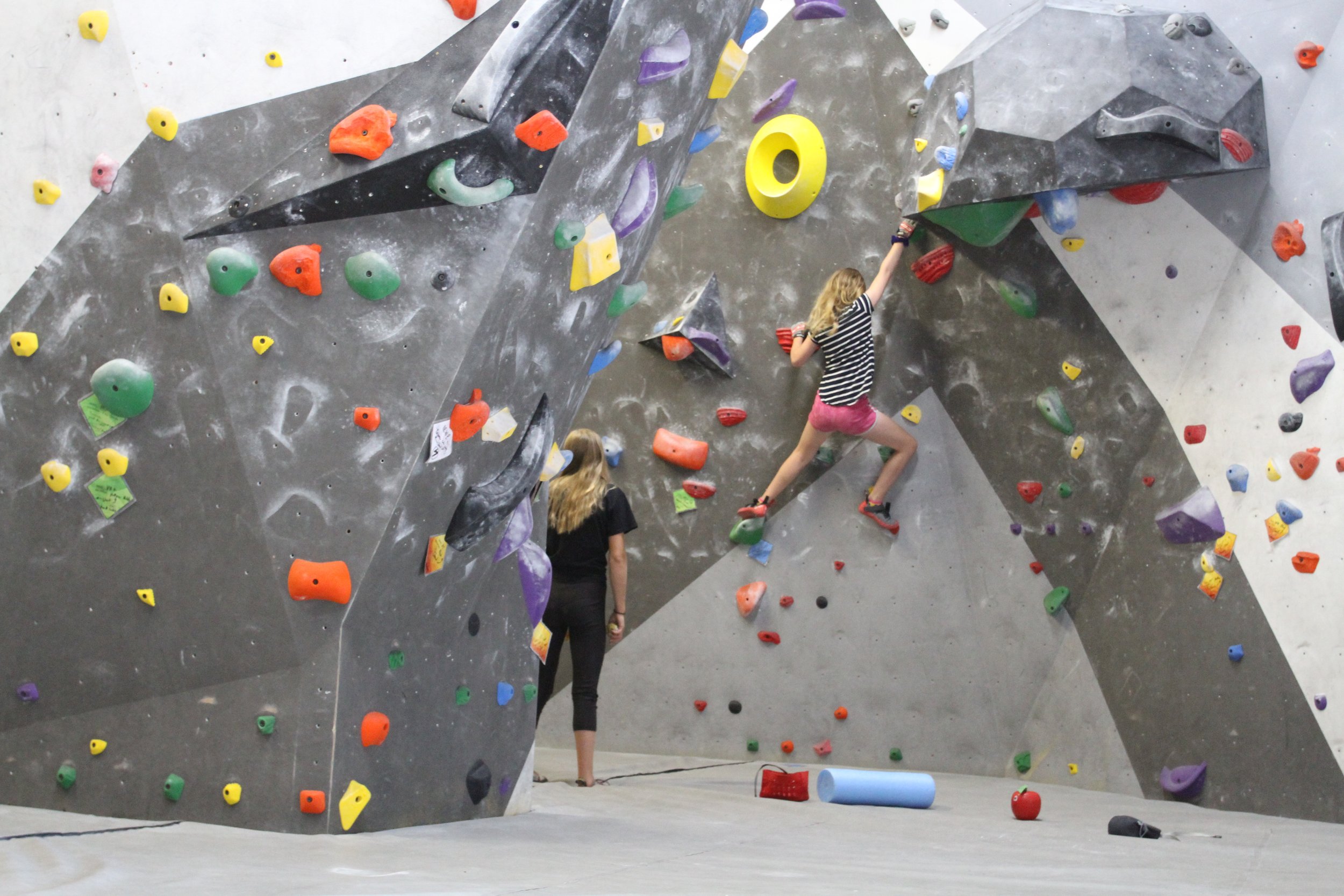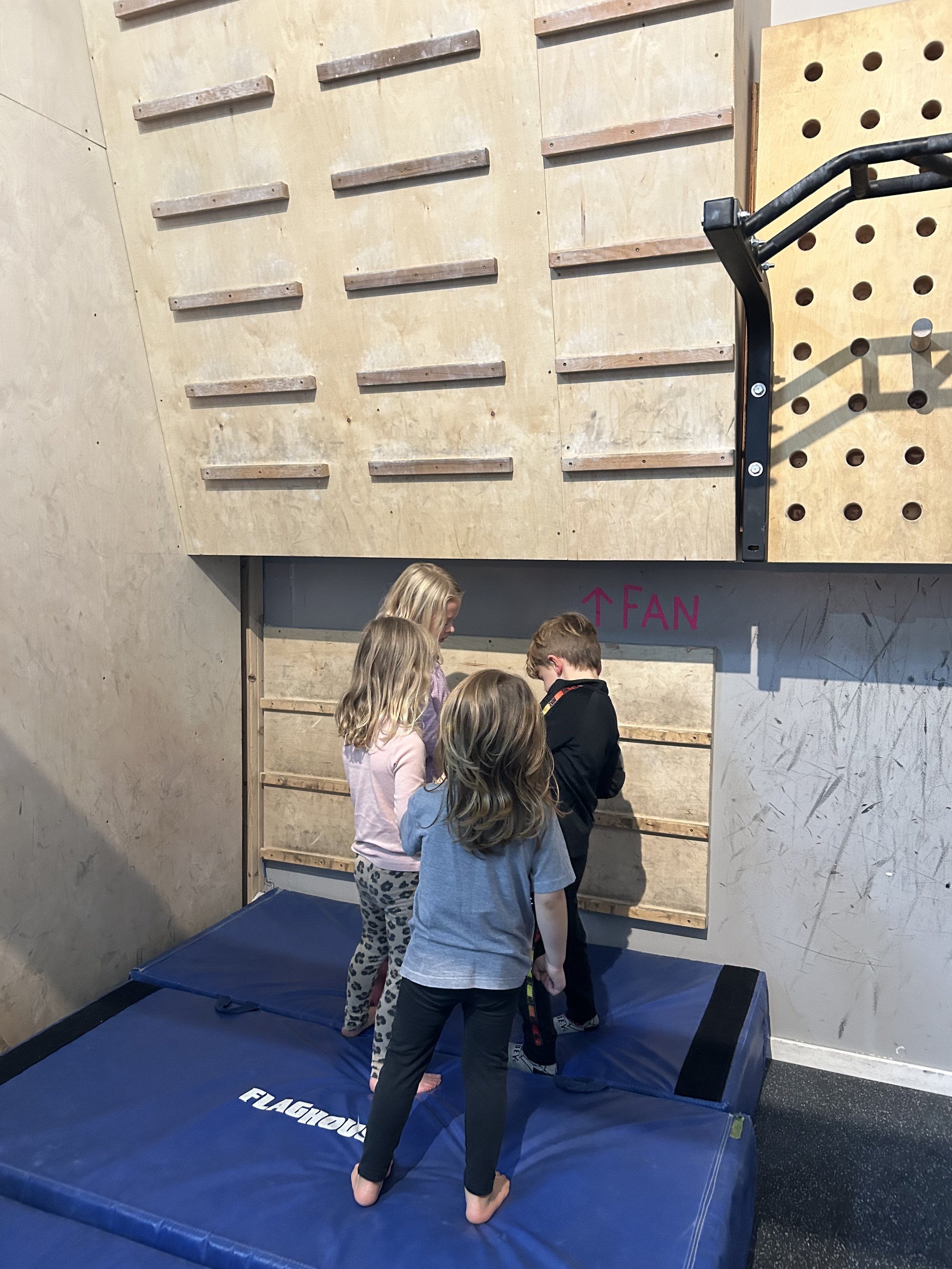WHAT IS BOULDERING?
Bouldering is a style of climbing exercised in short sequences of moves called problems.
It is also one of the simplest forms of climbing, done low enough to the ground to not require any special gear (no ropes), but a soft crash pad to fall on and climbing shoes to climb with.
"Solving" a problem often forces you to make unlikely movements such as hooking your heel ("heel hook") onto a hold or literally jumping from hold to hold ("dyno").
Bouldering is also one of the most social styles of climbing because it encourages people to gather around a boulder problem attempting to solve it and cheer each other on.
The beauty of bouldering is that it can be done without a belayer and it doesn't require special climbing knowledge.
Hangar Member Agreement
24/7 Membership Agreement
By signing up as a 24/7 member at The Hangar Climbing Lounge I agree to and acknowledge the following
I am signing up for 3 month minimum 24/7 membership; cancellation prior to 3 months will result in a final charge for the full 3 months
Sign up fee is applied every time you re-activate a membership after cancelling
Memberships can be paused for 1 month max, or a longer period due to injury, with the agreement of the Hangar management.
You will always check in on arrival
You will not share the door code with anyone else
You will not bring guests without permission from The Hangar
You will not use Hangar rental shoes or retail product (chalk etc.) without payment
You will not allow non-Members or non-paying guests access to the gym
You will contribute to keeping the gym clean and organized (equipment put away, chalk spills cleaned up, garbage put in bin)
If you open the gate you're responsible for making sure it's closed and locked again
You will turn all lights off and make sure the door is locked if you are last to leave
If you turn the heating on, turn it off when you leave
You are responsible for your own health and safety while climbing at the Hangar and acknowledge that you have signed and agreed to the Hangar waiver of liability
If there are any issues in the gym that need attention please notify the Hangar management by text to 604 200 2623
Disregarding these rules may result in cancellation of membership.
MUSIC
By the office door there is an iPad with Spotify and other radio stations. Please feel free to choose the music afterhours while you’re climbing. Please be mindful of other climbers when choosing your music.
PRIVATE BOOKINGS AND EVENTS
On Saturday mornings from 10am -12pm, there may be private birthday party bookings. On occasion, there will be other events happening at the gym and 24/7 access will be limited during those times.
EMERGENCY, INJURY & FIRST AID KIT
In case of emergency please phone 911. Keep in mind when you are climbing solo that this may be difficult to do under some circumstance and assess risk accordingly.
Under the front counter in a basket is the First Aid Kit and ice packs for any minor injuries.
Please report any serious injuries or near misses acquired at the gym to us by sending us an email with the details of what happened. We would like to be able to support you if needed and to improve gym safety and member health if possible.
SPINNERS
From time to time a hold becomes loose, we call this a Spinner. Under the front counter is a selection of Alan keys. Should you find a hold has come loose and needs tightening please feel free to use these Alan keys or mark the hold as loose with a Sharpie and tape and let us know.
The Power of Play & Climbing on Childhood Development
We’re drawn to play - all of us! Whether we’re 6 months or 80 years old, there are valuable lessons to be learned, as well as physical and mental health benefits that playtime has on the brain.
Increasingly, researchers are uncovering the values of one of the most developmentally important forms of play - climbing. We’re born to do it! We’re explorers, thrill-seekers, problem-solvers, and above all, curious. And we don’t just love climbing for the excitement and the challenge - there are biological reasons at play that attract us to it. Climbing aids in children’s mental and physical development, and has been shown to improve creativity, memory, and critical thinking abilities.
1. Climbing develops our spatial awareness, motor skills & memory
Climbing plays a key role in early childhood motor skills development. A study from PlayCore found evidence that climbing at a young age helps hone spatial and directional awareness, and also boosts physical skills such as balance, hand and foot coordination, and agility.
Using both hands and feet, and dealing with varying inclines, levels, and distances between platforms has been shown to enhance children’s proprioception - the ability to sense one’s own body’s position and movement in space… and we’d be lost without that ability!
In a 2015 study, psychologists from the University of North Florida found that “proprioceptively dynamic activities like climbing” can dramatically, and quickly, improve core executive functions like working memory. This is crucial not just for children’s processing of information, but for developing behavioral and some gross motor skills. The study showed that just two hours after climbing, participants’ capacity for working memory had increased by 50 percent.
2. Students who climb show higher academic performance
The benefits of monkeying around on climbers don’t stop at just coordination and motor skills - they affect kids’ performance in classrooms too. A 2008 study profiled the Phys Ed department at a Naperville, Illinois junior high school. They redesigned their gym class curriculum, replacing traditional sports with activities like dancing, bicycling, and climbing, and it wasn’t long before the school began seeing the results.
You guessed it - an hour a day of climbing lead to major academic improvements schoolwide! In addition to higher measures of physical fitness, the school reported fewer disciplinary incidents, and higher academic performance school-wide. The researchers concluded that this type of play was responsible for the students’ measurably enhanced memory, concentration, and mood.
Other school systems followed suit by swapping their old gym class curriculums with activities such as climbing. A western Pennsylvania school saw its standardized reading and math test scores skyrocket, from below average to 18 percent above average. An elementary school in Kansas City reported a 67 percent drop in suspensions from the previous year, and a marked increase in literacy, after implementing the climbing curriculum.
3. Kids solve problems by climbing at an early age
If you’ve ever gone to a bouldering rock gym, you’ll know that they call the routes that climbers take “problems.” That’s because your brain treats climbing structures like a series of problems that you need to overcome. The same cognitive functions involved in solving puzzles and using logic are in play when it comes to climbing.
Climbing at an early age teaches kids to adapt to new or unknown environments, and encourages goal-setting, determination, and planning. Whether you’re halfway up a rock wall, rappelling on belay down a cliffside, or scurrying up one of our sculptures, climbing is a puzzle waiting to be solved. It shows kids the value of decision-making and following through, while also boosting logic, memory, problem-solving skills, and concentration.
4. When kids climb together, they learn lifelong social skills
Climbing is far from a solitary endeavor - exploring a structure and working your way to the top encourages cooperation. Climbing is also an activity where each accomplishment is often celebrated, whether it’s reaching the top, or just doing something you didn’t know you were capable of. By exploring a climbing structure and working together with other children to forge a path to the top, many young climbers learn valuable lessons about teaching, listening and communicating.
When kids climb together, they are using the same social and cooperative skills that they will use with friends, in school, and at work later in life. Cooperation builds trust, and trust is at the center of every friendship.
***
It’s clear why people of all ages seem to love climbing so much! The same requirements and challenges presented on a climbing structure apply elsewhere in life - from problem-solving, to sequencing, to spatial thinking, to memory. So it’s no surprise that climbing is skyrocketing in popularity.
The Hangar offers kids climbing classes and school group bookings.





